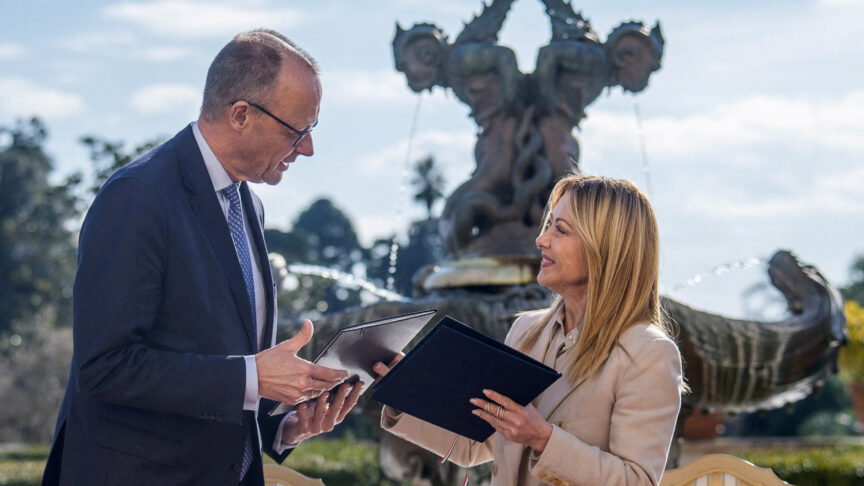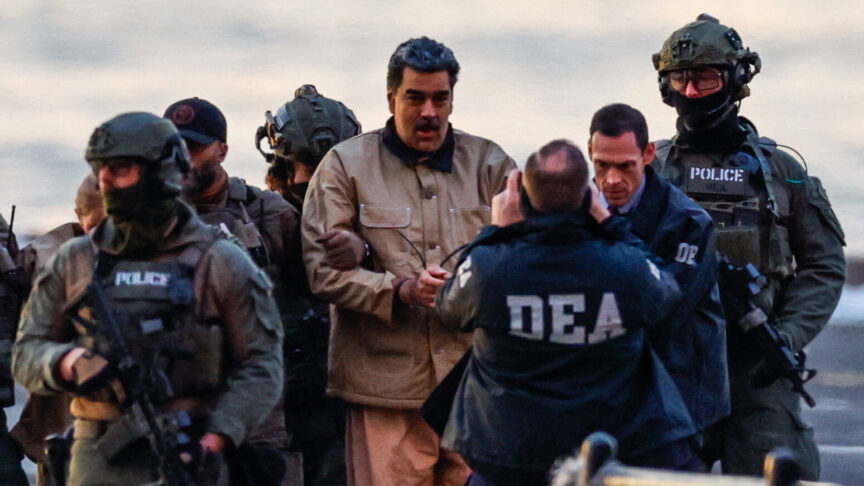Prominent Europeans call for change in approach to EU foreign policy
Now that Ursula von der Leyen has been appointed European Commission President, European governments must turn their focus on how Europe can stand up for itself and its citizens
As the world descends into geopolitical competition, Europeans are in danger of becoming hapless playthings in a tussle for pre-eminence between China, Russia, and the United States. But this can be avoided if Europeans take their destiny into their own hands. The EU member states collectively retain the biggest single market in the world, more defence spending than any power other than the US, the world’s largest diplomatic corps, and highest levels of development spending.
We therefore call on the new EU leadership team, who will take over in late 2019, to understand the challenge that confronts them and receive the tools they need from EU governments to change Europe’s approach to foreign policy. Together with Ursula von der Leyen, Charles Michel, the EU Council President elect, and Josep Borrell, candidate for HRVP, must move quickly to find ways of getting EU institutions to empower and channel the resources of foreign ministers and member states behind a common European foreign policy. They must:
- Set out on a quest for strategic sovereignty for Europe. This should have economic and financial elements (coping with secondary sanctions, the role of the dollar, payments systems, investment screening, technology regulation), security and defence elements (promoting greater European responsibility and resistance to conventional and hybrid threats including cyber) and political diplomatic ones (exploring how Europeans organise and reach out to others on multilateral issues). The HRVP must not run away from the most controversial issues in Europe’s foreign policy – China, Near- and Middle East, Russia, migration, the Balkans, Climate Change – but rather try to craft ways to go beyond the lowest common denominator by engaging groups of member states in a new grand bargain.
- Re-operationalise European security and defence. Europeans should take more responsibility for their security and become a better partner for the United States by strengthening the European pillar in NATO and taking over responsibility for missions in the Balkans and Africa. They must also consider innovations such as a European Security Council in order to – among others – engage the UK after Brexit.
- Build a stronger link between EU institutions in Brussels and national governments on foreign policy. If EU foreign policy is to be effective, it cannot just rely on a single HRVP to carry the political burden. The HRVP should be backed by deputies from the Commission covering key regional issues and task core groups of national foreign ministers to support him.
These steps help renew the EU and show its citizens that Europe can be the first line of defence in an increasingly uncertain world.
Signatories
- Douglas Alexander – Chair, Unicef UK; former UK Secretary of State for International Development
- Joaquín Almunia – former Vice President of the European Commission & Commissioner for Competition
- Timothy Garton Ash – Professor of European Studies, University of Oxford
- Marek Belka – Member of the European Parliament; former Polish Prime Minister and Head of the Polish National Bank
- Carl Bildt – Co-chair of the Board of ECFR; former Prime Minister; former Foreign Minister
- Emma Bonino – former Minister of Foreign Affairs
- Han ten Broeke – Director of Political Affairs, The Hague Centre for Strategic Studies (HCSS); former Member of Parliament
- John Bruton – former Irish Prime Minister (Taoiseach); President, IFSC Ireland
- Harald Braun – ECFR Council Member
- Ditmir Bushati – Albanian Minister for Europe and Foreign Affairs
- Gunilla Carlsson – ECFR Council Member
- Maria Livanos Cattaui – former Secretary General, International Chamber of Commerce
- Lucinda Creighton – former Irish European Affairs Minister
- Srdjan Darmanovic – Montenegrin Minister of Foreign Affairs
- Milica Delević – ECFR Council Member
- Ilinca von Derenthall – Head of Audit and Risk Committee, Chimcomplex Borzesti S.A.
- Anna Diamantopoulou – President, DIKTIO – Network for Reform in Greece and Europe
- Vaira Vike-Freiberga – former President of Latvia
- Sigmar Gabriel – Member of German Parliament, former Vice Chancellor and Foreign Minister of Germany
- Carlos Gaspar – Member of the Board of Directors, Portuguese Institute of International Relations (IPRI)
- Mihai Gotiu – Senator in the Romanian Parliament; former Vice-President of the Romanian Senate; former journalist
- Teresa Gouveia – Member of the Board of Trustees, Calouste Gulbenkian Foundation; former Foreign Minister of Portugal
- Jean-Marie Guéhenno – Senior Adviser, Centre for Humanitarian Dialogue; former President and CEO, International Crisis Group; former Under-Secretary-General, Peacekeeping Operations, UN Geneva
- Istvan Gyarmati – President and CEO, International Centre for Democratic Transition
- Fabienne Hara – Special adviser to donor government relations, Europe, Bill and Melinda Gates Foundation; Adjunct Professor, Sciences Po
- Ivailo Kalfin – former Bulgarian Minister of Foreign Affairs
- Sandra Kalniete – Member of the European Parliament; former Latvian Minister of Foreign Affairs
- Piia-Noora Kauppi – Managing Director, Federation of Finnish Financial Services
- Bert Koenders – Special Envoy, Worldbank; Professor International Politics, University of Leiden; former Dutch Minister of Foreign Affairs
- Miroslav Lajčák – Slovakian Minister of Foreign and European Affairs
- Pascal Lamy – Honorary President, Notre Europe; Chairman, Paris Peace Forum; former Director-General of the WTO; former EU Commissioner
- Remzi Lani – Director, Albanian Media Institute, Tirana
- Mark Leonard – Director, European Council on Foreign Relations
- Leiv Lunde – Senior Asia Advisor, Norwegian Ministry of Foreign Affairs
- Cristina Manzano – Editor-in-chief, Esglobal
- Dario Mihelin – Ambassador of Croatia to the People's Republic of China
- Nils Muiznieks – former Council of Europe Commissioner for Human Rights
- Katarzyna Pełczyńska-Nałęcz – Head, ideaForum, Stefan Batory Foundation
- Delphine O – Ambassador, Secretary General of the UN Woman Gloab Forum, French Ministry of Foreign Affairs; former Member of French Parliament
- Christine Ockrent – Commentator and writer; Presenter of 'Affaires Etrangères', France Culture Radio
- Hanna Ojanen – Adjunct Professor (Docent), University of Helsinki
- Andrzej Olechowski – former Polish Minister of Foreign Affairs
- Dick Oosting – former CEO, European Council on Foreign Relations; former Europe Director, Amnesty International
- Andrés Ortega – Writer and journalist from Spain
- Coen van Oostrom – CEO and Founder, OVG Real Estate
- Zaneta Ozolina – Professor, University of Latvia; former Director, Latvian Centre for Human Rights
- Ana Palacio – Former Minister of Foreign Affairs; former Senior Vice President and General Counsel of the World Bank Group
- Nicolò Russo Perez – ECFR Council Member
- Rosen Plevneliev – former President of Bulgaria
- Charles Powell – Director, Real Instituto Elcano
- Lia Quartapelle – Member of the Italian Parliament
- Adam Daniel Rotfeld – former Polish Minister of Foreign Affairs
- Norbert Röttgen – Chairman of the Committee on Foreign Affairs of the Bundestag
- Janet Royall – Principal, Somerville College, University of Oxford; former leader of the opposition in the House of Lords
- Marietje Schaake – former Member of the European Parliament
- Giuseppe Scognamiglio – Chairman, eastwest Institute; Editor, EastWest
- Javier Solana – former EU High Representative for the Common Foreign and Security Policy & Secretary-General of the Council of the EU; former Secretary General of NATO
- Jaap de Hoop Scheffer – former NATO Secretary General; former Dutch Foreign Minister
- Christoph Steck – ECFR Council Member
- Jonas Gahr Støre – Leader of the Norwegian Labour Party; former Minister of Foreign Affairs
- Andris Strazds – ECFR Council Member
- Ion Sturza – Founder & Chairman, Fribourg Capital; former Prime Minister of the Republic of Moldova
- Hannes Swoboda – former President, Progressive Alliance of Socialists and Democrats, European Parliament
- Henrik Thune – Director, Norwegian Center for Conflict Resolution (NOREF)
- Nathalie Tocci – Director, Istituto Affari Internazionali
- Vygaudas Ušackas – Former Lithuanian Minister of Foreign Affairs
- Romana Vlahutin – EEAS Ambassador at Large for Connectivity
- Andre Wilkens – Director, European Cultural Foundation; Co-Founder; Die Offene Gesellschaft
- Samuel Žbogar – Head of the Delegation of the EU to Macedonia; former Slovenian Foreign Minister
Signatories are all Council Members of the European Council on Foreign Relations.
The European Council on Foreign Relations does not take collective positions. ECFR publications only represent the views of their individual authors.


